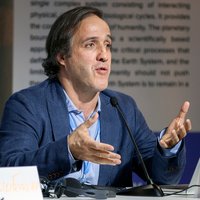The Earth System as Global Common
- Duration: 15 hours
- Effort: 15 hours
- Pace: Self paced
- Languages: English
- 1,720 already enrolled!
What you will learn
- Learn new scientific concepts in Earth System Science, Law, Governance and Social Sciences;
- Understand how the Anthropocene geological epoch impacts the future of climate issues;
- Learn to assess the climate crisis from a multi- and inter-disciplinary perspective;
- Be engaged in contemporary political discourse concerning the legal status of a stable climate;
- Research first-hand the measures and responsibilities you could apply in your urban environment.
Description
The challenge of looking at our planet as a single system!
In this course, we intend to address the challenge posed to the social sciences, by the recent evolution of Earth System Sciences, which approach the functional aspect of our planet as a single, deeply interconnected and indivisible system that knows no boundaries. How can this new approach of science be recognized and absorbed by the Law, which until now has treated this functional aspect of the planet as nobody’s stuff - res nullius - where the economy is sending the so-called “negative externalities” that have turned our planet's great circulation systems into the garbage dumps of the Industrial Age”.
This course was recorded in 2021-2022, and one of the modules is taught by the scientist who today is considered the “father of Earth System Science”. In this way, it is also a tribute to the life of Prof. Will Steffen.
Take up the challenge of combining the natural sciences with the social sciences and looking at our planet from a new point of view!
Prerequisites
This course is dedicated to everyone interested in the structural causes of the climate crisis and those willing to fight it.
Awareness and technological development are no longer enough to stop global warming. Societies need to create the minimum structural conditions necessary to enable collective action and achieve the goals set by multilateral agreements, such as the Paris Agreement.
The course was developed in English, with texts and subtitles available both in English and Portuguese.
Assessment and certification
Your knowledge will be tested throughout the course through quizzes that will prove your new skills.
To obtain the Certificate of Conclusion you’ll have to complete all evaluations (quizzes) and achieve a minimum percentage of 50% of correct answers.
Course plan
– with Prof. Katherine Richardson, University of Copenhagen, and Prof.Will Steffen, Australian National University
– with. Prof. Filipe Duarte Santos, University of Lisbon
– with Lionel Chami, Global Pact Coalition, and Prof. Klaus Bosselmann, University of Auckland
– with Prof. Viriato Soromenho-Marques, University of Lisbon
– with Prof. Alexandra Aragão, University of Coimbra, and Prof. Prue Taylor, University of Auckland
– with Prof. Louis Kotzé, North-West University, and Paulo Magalhães, Common Home of Humanity
– with Prof. Iva Pires, New University of Lisbon
Course team
Katherine Richardson
Categories
Will Steffen
Categories
Filipe Duarte Santos
Categories
Lionel Chami
Categories
Klaus Bosselmann
Categories
Viriato Soromenho-Marques
Categories
Alexandra Aragão
Categories
Prue Taylor
Categories
Louis Kotzé
Categories
Paulo Magalhães
Categories
Organizations
Organizers

License
License for the course content

Attribution-NonCommercial-NoDerivatives
You are free to:
- Share — copy and redistribute the material in any medium or format
Under the following terms:
- Attribution — You must give appropriate credit, provide a link to the license, and indicate if changes were made. You may do so in any reasonable manner, but not in any way that suggests the licensor endorses you or your use.
- NonCommercial — You may not use the material for commercial purposes.
- NoDerivatives — If you remix, transform, or build upon the material, you may not distribute the modified material.
 serviços digitais da FCT
serviços digitais da FCT












